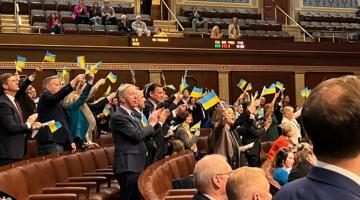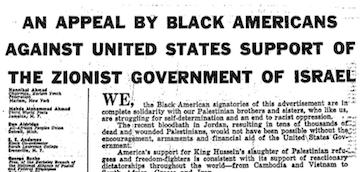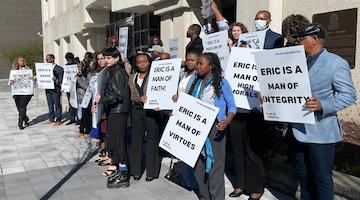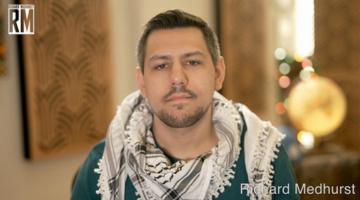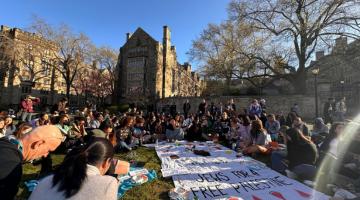by BAR executive editor Glen Ford
The movement that emerged in Ferguson must define itself through the demands it makes of Power – “a truth that appears to have been widely forgotten in the two generations since Black America last experienced a mass movement.” “Black Lives Matter” is not a demand, and the organization that coined the slogan is busy collaborating with Power, in the Democratic Party.
Demand Nothing, Get Nothing: The Movement Needs to Say What It Wants
by BAR executive editor Glen Ford
“In a remarkably short space of time, the #BLM-CZ networks went from agitation to accommodation.”
The most significant achievement to date of the incipient movement that emerged last summer in Ferguson, Missouri, has been to put the collaborationist Black political classes on the defensive. The first casualty was Al Sharpton, the Obama administration’s infinitely corrupt pit bill, who was effectively de-horned by his failure to contain Black rage against the criminal justice system. When the Black “street” rejected Sharpton and other accomodationists, the ruling order moved to absorb and co-opt elements within the movement, itself. This remarkably successful counter-offensive has brought the #BlackLivesMatter (#BLM) network and its less polished offshoot, Campaign Zero (CZ), safely into the Democratic Party matrix – a mausoleum for movements.
It was an easy victory for Power – more like a friendly merger – since #BLM and CZ were quite eager to be gobbled up by the Democrats, so that they might get talking parts in the election year media extravaganza. In a remarkably short space of time, the #BLM-CZ networks went from agitation to accommodation, as quasi-official components of the Democratic wing of the ruling duopoly and chat-friends with the likely next President of the United States. For those seeking to work their “inside” game, the emergent movement has been a veritable stairway – no, an express elevator – to power-broker heaven!
Although the #BLM network comprised only a fraction of the broad array of organizations and individuals that have been set in motion, the “Black Lives Matter” brand and slogan was almost universally adopted by the emergent movement. This has resulted in general confusion as to who is working with whom. Thus, although #BLM and CZ are locked in mutual embrace with the Democratic Party, activists not under their direction continue to shout “Black Lives Matter” while sometimes disrupting Democratic Party events.
A dozen student activists from the Atlanta University Center (#AUCShutItDown) last week put their fists up, shouted “Black Lives Matter” and sang songs at a Democratic Party rally for Hillary Clinton, interrupting the candidate’s litany of lies and thoroughly embarrassing Atlanta mayor Kasim Reed, former mayor Shirley Franklin and Rep. John Lewis, representing the city’s Black Misleadership Class. Clinton seemed surprised and confused. Hadn’t she neutralized that “Black Lives Matter” crowd? Clinton whined that she’d been meeting with #BLM and planned more talks with them. Members of the crowd shouted, “Hillary, Hillary" and “Let her speak.” Loyal Black Democrats formed a shield in front of the war criminal. Congressman Lewis, who is said to be scheming to have Selma’s Edmund Pettus Bridge named after himself, put his arms on a protester’s shoulders, urging them to desist, and the group left shortly afterwards. “I am glad the congressman and the mayor have my back," said Clinton.
“Loyal Black Democrats formed a shield in front of the war criminal.”
Of course they have her back. The Democratic Party is the greatest impediment to independent, self-determinationist politics in Black America. Its near-hegemonic presence has prevented the emergence of a Black oppositional movement for two generations – which is why it was possible to impose a mass Black incarceration regime so pervasive that one out of eight prisoners on the planet is an African American. Kasim Reed, Shirley Franklin, John Lewis and their ilk facilitated the establishment of the Mass Black Incarceration State.
A review of Twitter – the virtual nation in which Campaign Zero spokesman DeRay McKesson resides – shows that #BlackLivesMatter co-founders Alicia Garza, Patrisse Cullurs and Opal Tometi made no mention of the Atlanta demonstration. Among the hundreds of tweets generated by McKesson in the days after the protest, there is one comment on the #AUCShutItDown action. “So, when I saw the protest at the Hillary rally in Atlanta, I think they were essentially saying, ‘Where's the plan?’ vs. more speeches,” he tweeted.
McKesson’s impression is essentially correct. Avery Jackson, a spokesman for the Atlanta University Center activists, was interviewed by CNN’s Don Lemon, who asked if Jackson was pleased with Clinton’s offer to ban the check-box for criminal records on job applications and eliminate the differential in crack cocaine penalties. “That’s what we are on board for,” the student leader replied. However, his group is concerned that Blacks “really are at the priority and center of this conversation.”
That’s not a demand. There are also no substantive demands in the group’s founding statement, except that “#AUCShutItDown demands that we emancipate the disenfranchised, silenced, and erased individuals of the Diaspora.” The young activists are willing to confront Power – including Black minions of Power, which is perhaps the most urgent task – but they have not formulated demands to be made of Power and around which the people can coalesce.
DeRay McKesson and his Campaign Zero crew have made no demands on Hillary Clinton, and neither has the #BlackLivesMatter network. Or rather, it appears their underlying demand all along was to be welcomed into the Democratic Party’s internal processes, which they achieved with the Democratic National Committee’s endorsement, this summer, and the offer of a town hall campaign event.
“Brothers and sisters in the streets have voiced a common demand: “Killer Cops Out of Our Community.”
Movements are defined by their demands – a truth that appears to have been widely forgotten in the two generations since Black America experienced a mass movement. There are Revolutionary Demands, such as for the abolition of prisons, which cannot occur absent a thorough social transformation. There are genuine Reformist Demands, which can be achieved without an overthrow of the rulers, but restrains them, while enhancing the power of the people and materially improving their actual conditions. An example: a demand that the U.S. Justice Department bring the number of Blacks incarcerated on drug charges down to the level of white drug offenders in the federal system, within a given time period. And then there are “reforms” that amount to tinkering around the edges without effecting real change in the essential status quo. Such “concessions” may actually make the prevailing order more palatable, and give a false impression of progress and popular empowerment. Examples include more training for police, without altering the core police mission in the Mass Black Incarceration State.
The Black Is Back Coalition for Social Justice, Peace and Reparations demands Black Community Control of the Police, which is meant as a Revolutionary Demand. Black Is Back will rally and march on the White House on Saturday, November 7, under the banner “Black Power Matters,” to be followed on Sunday with a conference at Howard University’s Blackburn Center, where there will be an intense discussion of the critical importance of demands in the current movement.
It’s not as if the people don’t have demands. In countless demonstrations since Trayvon Martin was murdered in 2012, brothers and sisters in the streets have voiced a common demand: “Killer Cops Out of Our Community” – meaning the exit of the despised occupation army from “our” self-determining communities. The people have already spoken. Let’s make our demands, accordingly.
BAR executive editor Glen Ford can be contacted at [email protected].

